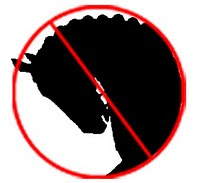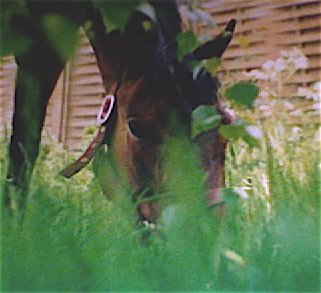Yeah, I'm still alive. Just had to find a new place to stay for myself, Calvin the cat, and my two horses, and, while one has to make major changes in one area of life, why not take the plunge, and make them in others too, and find a new job as well? Especially when you can't help but sense that your current boss doesn't really need you to work for her full-time anymore, and you've thought of trying something completely different anyway? As of today, I've found a new place to stay, and a new, completely different job.
Anyhow, the reason why I thought I'd write a new post is this post on Rossa Forbes' blog Holistic Recovery from Schizophrenia about the latest of Mark Foster's letters to Robert Whitaker, that had me remember another of his letters, this one, and my comment to it, originally posted at a Facebook thread. Since not everybody is on Facebook, and can go and read it there, here it is:
A very insightful piece, yes. Anyhow, some critical thoughts:
- "Some of my patients are very complicated with severe emotional or even psychotic disturbances, but those are rare."
What I read between the lines here is that emotional "disturbances" are different from "psychotic" ones. In how far? I went to a talk about "psychosis", given by a psychiatrist, back in November last year. According to this psychiatrist, and also according to what I've been reading virtually everywhere where "psychosis" is defined, fear is one of the main "symptoms" of "psychosis". Fear, and anger (with anger being the emotional response to fear). Fear and anger are emotions. Now, the list of "symptoms" for "psychosis" also includes so-called "thought disorders", "hallucinations", "delusions", etc., so you might say, there are other than emotional "disturbances" involved in "psychosis". However, my personal experience is that at the core of all these other "disturbances" are fear and anger. These emotions are what creates all other "disturbances". Just like sadness, grieving a loss, usually creates other than emotional "disturbances" ( inability to concentrate, withdrawal from social contexts, etc.). So, my take on this is that "psychotic disturbances", too, are emotional "disturbances".
- "What I mean is that most patients do not show signs of a pathological disturbance in their mental functioning. Rather, they are sad, lonely, anxious, frustrated, disillusioned, confused, scared--all in all, they seem very human, suffering from some of the mood changes that are endemic to the human experience. In the vast majority of these cases, major social and environmental factors are the clear precipitants of their symptoms: death in the family, job loss, marital struggles, substance abuse."
Basically, the same applies to this quote, and my question here would be, exactly where do we draw the line between what Mark Foster calls a "pathological disturbance" on the one hand, and existential, to human nature very natural, emotional suffering, "endemic to the human experience", as Mark Foster says? Or, to maybe push it to extremes, but nevertheless, where do we draw the line between naturally suffering human being, and sick-in-the-head lesser-than--human being? And who has the power to draw this line, on what basis? Towards the end of the article Mark Foster writes: "Some diseases, some mental illnesses, are severe, debilitating, life-threatening." He doesn't name which diseases he refers to, but when "mental illness" is talked about there's always one specific label that, if no other of all the labels in the DSM, seems to simply have to be a true disease: schizophrenia. Because if a reaction to life as extreme as what is labelled "schizophrenia" is just that, a reaction to life, and not a true disease, then no label in the DSM is a true disease. Psychiatry as a medical speciality stands and falls with "schizophrenia", and how we define the experience labelled as "schizophrenia". Or "psychosis".
Even among the people, who have successfully overcome what psychiatry calls "schizophrenia", there are many who would agree with Mark Foster. Joanne Greenberg and Norwegian Arnhild Lauveng are just a couple of them, referring to themselves as having been sick, having suffered from "schizophrenia". Anyhow, there are also quite a few people, and I am one of them, who do not define themselves as having been sick, as having suffered from this "severe mental illness" called "schizophrenia", although they've perfectly fitted the criteria for the label. Because they don't agree that it is sick to react to life. And here Mark Foster omits to mention an important item on his list about adverse life events: childhood trauma (that comes in all imaginable shapes, not just as physical, or sexual abuse). Only if this item is omitted, "schizophrenia" (and other "severe mental illness" such as "bipolar disorder", or "major depressive disorder", for that sake) can be explained away as being true illnesses, the manifestation of an individual flaw, be it genetic, biological (biological psychiatry), or developmental (Freud), and not understood as an actually life-saving (sic) response to life-threatening circumstances. And this leads me to Mark Foster calling these responses "debilitating" and "life-threatening". I know a lot of people, and as mentioed I am one of them myself, who would answer him to this statement that they developed "symptoms" because they had no other choice if they wanted to survive in a for them life-threatening situation, that their ability to develop "symptoms", to react in the life-threatening situation they found themselves in, actually saved their life, and that therefor they don't see this ability as "debilitating", a weakness, an illness, or anything along those lines, but actually as a strength. And indeed, life that doesn't react to its environment isn't fit to survive in it. If we're talking a single cell, or a complex organism such as a human being. Fact is, people do not die from "mental illness". They survive thanks to it, and if they die, they do so because their experience, their life story, they themselves, are explained away as "diseased", and not understood. It is not "mental illness" itself that is life-threatening. It is the fear and lack of understanding that people who react in an extreme way to extreme circumstances are met with.
Given these very different definitions of "severe mental illness", and given the fact that we do not have scientific evidence to prove one definition more true than the other, while we do have "anecdotal" evidence that may well be interpreted to support a view of the latter definition as more true than the illness-definition (cf. that most people do not refer to themselves as "diseased" but after they've been in contact with psychiatry, and that they actually often resist being defined as "diseased", and need a whole lot of "treatment" before they're ready to submit to this definition), I wonder how Mark Foster justifies his statement.
This is a complex matter, and there would be a lot more to say to it, too much for a comment on facebook...
One last thing: Mark Foster writes that the motivation to become a medical professional for most people is that they want to help others. I don't doubt that. But what I find a far more interesting question is what is the motivation behind wanting to help others? Is it imaginable that it, at least in some cases, is a profound feeling of being helpless oneself?...
Oh and, why I mention the talk by the psychiatrist: the way fear was presented by her, not fear of something, but simply fear, a meaningless symptom of a meaningless illness, turned fear, almost magically you might say, from being a natural human emotion into something completely alien (as in alienation... ) to human nature. Fear was no longer an emotion. It was a symptom, and as such it had to be feared... This is how we alienate people from the labelled, and the labelled from themselves. This is what the "stigma", the discrimination and prejudice is made of. Us and them. Human beings and "psychotics"/"schizophrenics". Sad.
healing is living ritual
4 days ago






7 comments:
Thanks for elaborating on the widespread belief by doctors that some people are intrinsically mentally ill. Also, best wishes for your new job.
Thanks Rossa! You bet, I'm excited. :)
I'm hoping your new job keeps you from over-involvement in other people's medical issues. Perhaps you could put your salary towards real qualifications in the field of psychiatry, then others would take your endless diatribes about so-called `abusers' more seriously.
Anonymous, medical issues? I don't know what you're talking about. This blog isn't about any medical issues at all. And if you don't like it, why don't you just go read somewhere else?
If anybody wonders: "Anonymous" is a Michael Schofield supporter.
Marian,
Sounds like you've had a lot of changes in your life, in a short period of time... I've been there myself, once or twice....
I hope all goes well, especially with the new job!
Duane
Marian--
I have changed my thinking about this topic, in large measure because of conversations we've had in the past. It used to seem sensible to me to separate "mood" (i.e., "emotional") disorders from psychotic illnesses. But now I see them both as resulting from information processing that proceeds more chaotically than average. When I look at my own experience with a psychotic diagnosis (which by the way was diagnosed as a manic psychosis and hence traceable to mood/emotion), I remember that the 'delusions' I entertained were highly colored by my emotional reactions. Having just experienced a traumatic psychiatric hospitalization for depression, I was frightened of the mental health clinicians who had the power to confine me involuntarily. In my mind, I believed them to be godlike beings who were judging my moral failings. Delusional from one perspective, but rather accurate from another. As I think back, I believe the delusions arose from the intense fear these people inspired; the fear did not arise from my delusions (though it may have been worsened by them.) I wouldn't be diagnosed as schizophrenic, so I'm not sure if my experience generalizes to whatever goes on in the minds of those unfortunate enough to earn that label. But I'm guessing it would. You might be interested in <a href="http://blogs.psychcentral.com/happiness/2011/05/mental-software-vs-brain-hardware/>the post</a> I happened to write today about a related topic. Anyway, thanks for pushing me to read Whitaker awhile back. His book helped me rework my position on these issues. Take Care.
Post a Comment